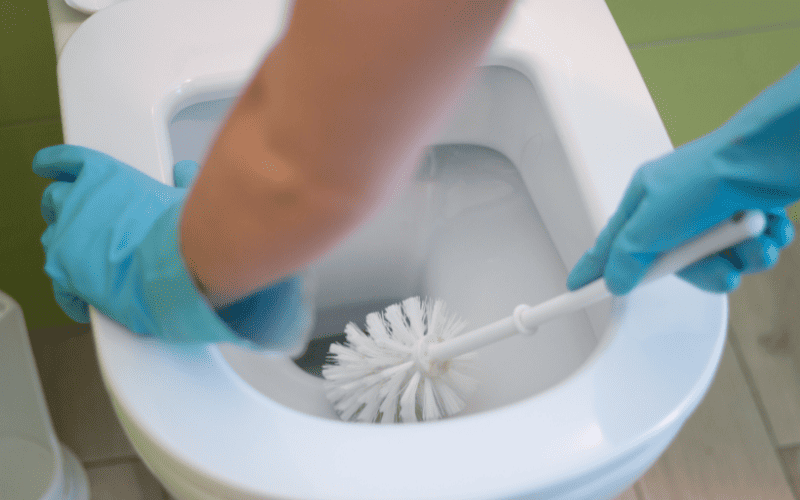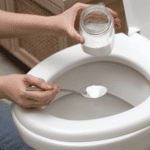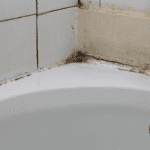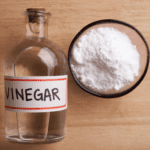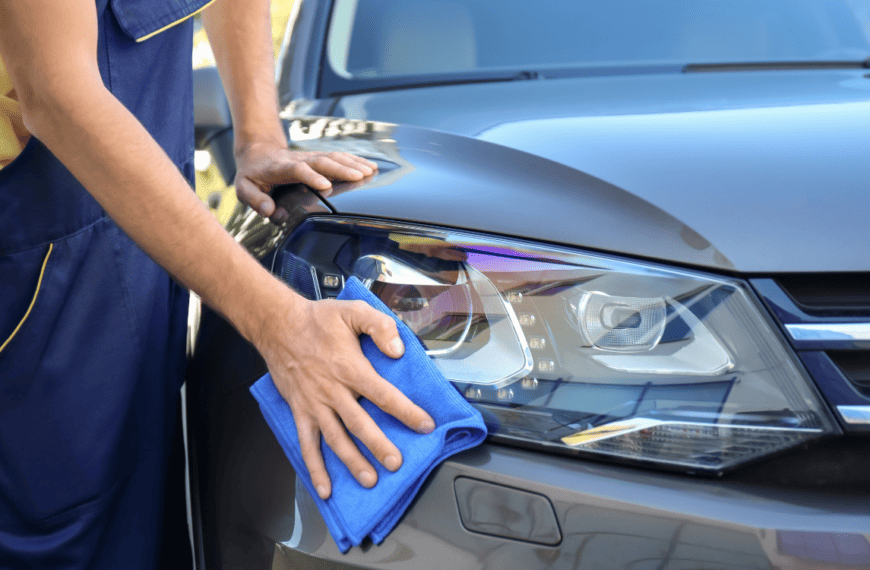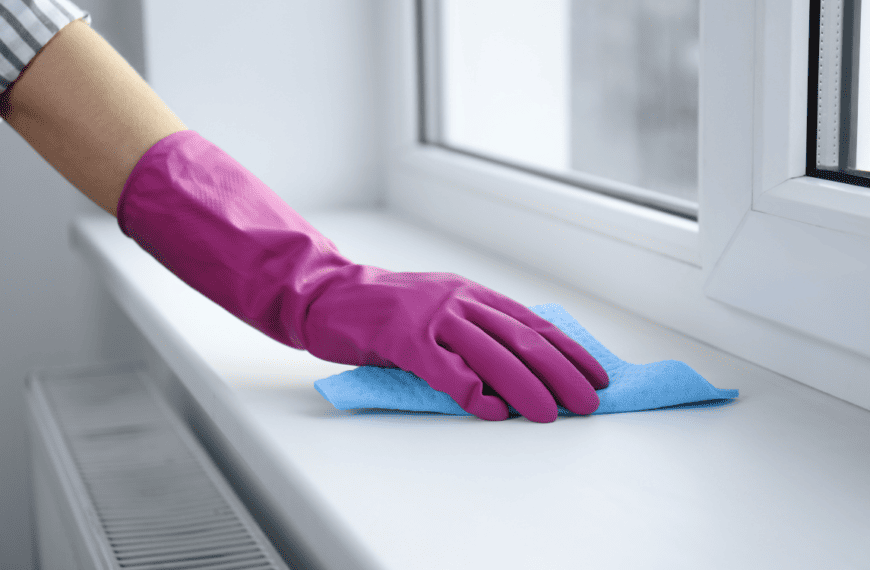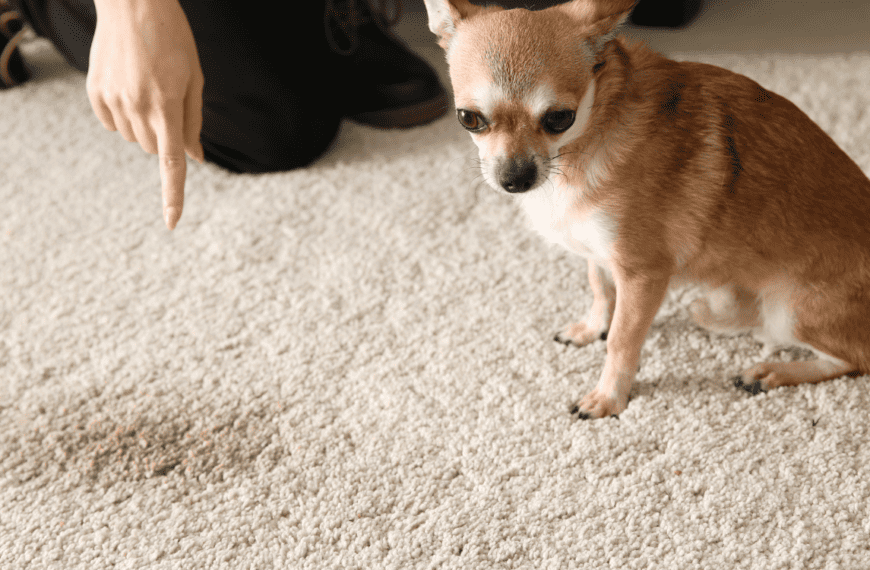Unsightly hard water stains are an ongoing battle on several fronts throughout the home, including the toilet. Managing mineral deposits is rarely a priority for most of us as we deal with all the other nastiness around the toilet bowl. But it’s no less essential in keeping a sparkling clean bathroom. Forget them for too long, and you’ll wind up with persistent stains and even clogging issues.
We know adding another chore to the cleaning checklist doesn’t sound appealing. But stopping mineral deposits from ruining your toilet doesn’t have to be strenuous or time-consuming. Skip the aggravation of a challenging cleaning job by following these tips and tricks to prevent hard water stains in toilet bowls.
If you don’t need to know about removing hard water stains, go on and skip to the section on preventing limescale and hard water stains in toilet.
How to Identify Hard Water Deposits
Hard water stains look like white, chalky grunge. When water evaporates, it leaves calcium, magnesium, carbonate, and other mineral solids behind. You’ll see this develop on wet surfaces around the house, like shower walls, sink basins, and the inside of the dishwasher.
Can Vinegar Get Rid of Hard Water Stains and Limescale?
Acid is the preferred solution to tackle hard water stains. Aggressive options like muriatic acid are highly efficient but can damage the affected surfaces and potentially harm you. Though quick to break up limescale, they’re not as practical for the average DIYer once you consider the extra safety precautions.
Milder acids like citric acid in lemon juice or acetic acid in white vinegar are the more sensible solutions for hard water in the toilet bowl. They’re inexpensive, easy to use, and, in vinegar’s case, readily available in abundance.
Distilled white vinegar is generally the most convenient DIY toilet bowl cleaner. But a higher concentrated cleaning vinegar can also power through stubborn hard water stains without the risk of damaging your porcelain.
How to Remove Hard Water Stains with Vinegar
Pour undiluted white vinegar into a spray bottle. Spritz the toilet bowl liberally to coat the hard water stains. Let the solution sit for at least 30 minutes. Scrub with a toilet brush to remove the mineral deposits. Use a stiff bristle scrub brush or the non-abrasive scrubbing side of a kitchen sponge for extra-tough stains.
Tip: One of our top tips for using vinegar in the bathroom is to saturate paper towels with vinegar and adhere them to the bowl’s lining. Doing so will keep the vinegar attached to the hard water stains for as long as possible. Lining the rim with paper towels will also let any buildups around the fill holes break down quicker.
Does Baking Soda and Vinegar Remove Hard Water Stains?
Baking soda and vinegar are two of our favorite DIY all-purpose cleaners. I won’t argue their standalone merits, but I’m wary of the advice I find on using them together for hard water stains.
When you mix vinegar and baking soda, they separate into CO2, water, and sodium acetate. As the CO2 forms, it erupts in the bubbling we commonly associate with cleaning action.
The reaction is exciting but doesn’t necessarily do anything special for cleaning stuck-on grime. Acid is the key, and you’re not creating anything more potent than vinegar by tossing in baking soda. It may still work to your satisfaction, but the addition is superfluous and a waste of product you could put to better use elsewhere.
DIY Hard Water Stain Removers
Given vinegar’s cleaning versatility, you may burn through it faster than you expect. If you’re all out but still have hard water stains in the toilet bowl to clean, there are countless replacements around the household to try. The secret is finding one with a prominent acidic component. A few clever DIY cleaning solutions include:
- Cream of tartar: Make a paste with water and apply it to the stain
- Potatoes: Containing oxalic acid, potatoes can remove light hard water stains. Cut one in half or use potato skins to rub on the stain
- Lemon juice: The citric acid in lemon juice works like the acetic acid in white vinegar to break down limescale deposits
- Soda: Phosphoric acid in cola is a potent hard water and rust remover
How to Remove Hard Water Stains with Sandpaper
You can clean up hard water deposits in only a few minutes by rubbing them with extra-fine sandpaper. Keep the bowl wet while cleaning to prevent scratches, and rinse when finished.
As a potentially harmful material, sandpaper shouldn’t be your primary choice when vinegar is available. But you can use sandpaper and vinegar in tandem to speed things up if you have thick hard water stains in your toilet. Scrub away the mineral buildup to a thin layer, and soak it with vinegar to break down the rest.
Pumice Stone Scouring Tool
A pumice stone tool like the DISIWENE pumice cleaning stone is gentle on porcelain but effective against hard water stains. The stone can dig into hard-to-reach corners and has a handle to keep your hand from getting too close to the bowl. Like sandpaper, pumice stone must stay wet to avoid damaging the toilet bowl.
Commercial Hard Water Stain Cleaners
Toilet bowl cleaners like Lysol Toilet Bowl Cleaner Gel typically include hydrochloric acid as their active ingredient, a highly effective solution for hard water mineral deposits. The angled nozzle makes applying it under the rim much less awkward. A viscous gel, the cleaner will hold onto grime to let the acid take effect. After letting the solution sit for several minutes, it should scrub away easily.
Bar Keepers Friend
With oxalic acid as its primary ingredient, Bar Keepers Friend is a multi-purpose miracle cleaner for stains, rust, and hard water buildup around the house. Shake the solution, apply it to a porcelain-safe scrubbing sponge, and rub away the mineral deposits. Dense stains will require a bit of elbow grease. But the thick liquid can also cling to hard water if you want to let it rest for a few minutes before cleaning.
Does CLR Get Rid of Hard Water Stains and Limescale?
CLR is a handy tool for cleaning hard water stains around the house. The solution only needs to dwell a few minutes to cut through challenging spots. You can use the classic CLR PRO Calcium, Lime & Rust Remover, but the foaming spray with Lavender scent one may be the most practical and pleasant option for toilets.
Removing Hard Water Stains from Household Surfaces
The solutions that work on your toilet’s hard water stains can also knock out limescale around the house. Vinegar and other mild acids can destroy hard water on shower doors, sinks, and more. But before using them with reckless abandon, consider the surface to avoid unnecessary damage.
Acids can harm stone materials, such as granite countertops, and metallic surfaces, like stainless steel sink basins. Protect them by diluting your cleaning solutions with distilled water. After cleaning the stains, rinse the area with fresh water to remove any lingering acid.
How Do I Stop Limescale from Forming in My Toilet Bowl?
Cleaning your toilet regularly with vinegar will prevent hard water stain buildups. Add a little vinegar to the bowl and scrub away stains with your toilet brush once weekly. Since you’ll likely have hard water buildups in your toilet tank, a monthly vinegar application up top can keep the whole system clean.
If you don’t want to use vinegar, citric acid is dynamite against hard water buildups. Sprinkle a generous amount into your toilet tank, let it sit for an hour or two, and flush it away.
Whether you use vinegar or citric acid, you can speed up the chemical reaction with warmer water. Turn off the toilet’s water supply, flush to drain the tank, and fill it with warm water before adding your cleaner.
What Is the Best Product to Prevent Hard Water Stains in Toilet?
Regular cleaning and vinegar flushes are simple and cheap practices to prevent hard water stains in the toilet. But you can save yourself loads of trouble by rooting out the problem at the source.
If your water has a high mineral content above 120 mg/L, you may want to consider a water softener. Water softeners replace incoming calcium and magnesium ions in water with sodium ions. Working along a whole-home filter, a softener reduces the mineral content before it reaches your plumbing, fixtures, and appliances. With this, you’ll eliminate numerous cleaning and maintenance needs around the home.
Testing your water with a cheap hardness test kit will tell you whether you need a water softener. They’re expensive to install and need regular upkeep. Plus, overly soft water also comes with unique disadvantages. You’ll only want to use a water softener when your water’s hardness puts your home at risk.
Why Does My Toilet Get Hard Water Stains?
Hard water stains appear due to dissolved minerals, namely calcium and magnesium, in your water supply. When well water picks up these naturally occurring materials, it leaves them in plumbing and around fixtures.
Hazards of Hard Water in the Home
Hard water is harmless and even potentially beneficial to people. But to your home? Not so much. It can clog pipes and damage home appliances. like your water heater, dishwasher, washing machine, or water-connected refrigerator. Soaps also don’t lather in hard water, affecting their efficiency. Washer performance will plummet, and you may suffer brittle hair and dry skin from showering.
When mixed with soap, hard water salts create a precipitate, an off-white, insoluble residue we call soap scum. As it contains hair, dead skin cells, and other organic matter, soap scum readily harbors mold and bacteria. Removing this buildup while cleaning shower doors, tubs, and sinks should be a focus during your cleaning routine.
Are Hard Water Stains and Limescale Permanent?
Although they aren’t permanent, hard water stains will gradually become more challenging to remove the longer you let them sit. Cleaning whenever small stains form will help you avoid harsher stain removers. Brush your toilet at least once weekly and flush the toilet tank with vinegar monthly to keep your toilet fresh and functional.

